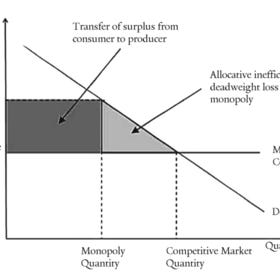Originally Published April 12, 2022
The consumer welfare standard (CWS) has been a staple in antitrust analysis for the better part of 40 years, surviving relatively unharmed through both Democratic and Republican administrations over its lifetime. A shift has occurred in the past few years, and when reflecting on the ABA Antitrust Spring Meeting last week I realize that the days of a wholesale defense of the CWS are likely behind us.
In an attempt to correct this mistake, I have focused this month on pushing back against detractors of the consumer welfare standard. First, I kindly put forth edits to the recent letter from the Antitrust Division to the Judiciary Committee Leadership, supporting proposed antitrust legislation. Next, I lay out a path forward for thinking about the CWS in a dynamic economy and defend the CWS in a pair of responses in ProMarket and the Wall Street Journal. Finally, Andrew Mercado and Christopher Kaiser discuss why monopoly fears in the economy are overblown and why there is no cause for alarm.
Suggested Redline Edits to the DOJ’s Letter to Judiciary Committee Leadership | Truth on the Market
The Biden administration finally has taken a public position on parallel House and Senate bills that would impose new welfare-reducing regulatory constraints on the ability of large digital platforms to engage in innovative business practices that benefit consumers and the economy. The administration’s articulation of its position is a fine example of draftsmanship, and with just a few very minor redline edits, which I suggest in my commentary for Truth on the Market, the letter would advance sound and enlightened pro-competitive policy.
Toward a Dynamic Consumer Welfare Standard for Contemporary U.S. Antitrust Enforcement | Truth on the Market
For decades, the consumer welfare was at the center of competition policy and its enhancement was paramount. This idea has changed. Populist challenges in recent years have advocated for expanding antitrust’s understanding of welfare to include the gamut of social prerogatives, firm size, and “fairness.” In a recent commentary for Truth on the Market, I lay out four principles that can be used to think about consumer welfare in a dynamic economy like the U.S.
The Consumer Welfare Standard and Antitrust Enforcement: a Response | ProMarket
A sudden change toward significantly more intrusive antitrust enforcement, far from strengthening the economy, would likely inject unwarranted uncertainty into business planning. Pushing back against a recent article by Leah Samuel and Fiona Scott-Morton, I note in ProMarket that competition has not declined during the reign of consumer welfare, and the standard has not been misapplied. American competition is vibrant and robust, and enforcers, judges, and legislators should keep innovation, growth, and consumers welfare in mind before overhauling a system that is working as it should.
Why Consumer Welfare Remains the Standard for Antitrust | Wall Street Journal
Competition law need not conflict with the rule of law. In a response in the WSJ to the eloquent defense of consumer welfare by Christine Wilson and Phil Gramm, I argue that calls for arbitrary enforcement based around new standards such as “fairness” should be cast aside. Consistency and predictability are what the economy needs, not novel enforcement that threatens the American innovation and growth.
Monopoly Fears About Big Tech Are Overblown | Discourse
Politicians are worried that the large companies dominating Big Tech, such as Facebook and Twitter, are monopolies that will exploit consumers or workers by charging higher prices, selling lower-quality products or paying lower wages. But market concentration is not the only factor that determines competition. Andrew Mercado and Chris Kaiser, in a commentary for Discourse, explain that just because there are only a few large tech companies doesn’t mean they are immune from competitors, especially if new companies are allowed to enter the market.
www.discoursemagazine.com • Share
Upcoming Events
Podcast with Joshua Wright and Douglas Melamed
Professors Joshua Wright and Douglas Melamed are among the leading scholars on antitrust today. In a podcast to be released later this week, I sit down with them to discuss enforcement trends in the past 40 years, the Executive Order on competition, merger guideline revisions, antitrust legislation, and more. Check out my twitter later this week for the link to the discussion.
April 21 -22, 2022: Stigler Center Antitrust and Competition Conference - Antitrust: What’s Next?
Following my response to Fiona Scott-Morton in defense of the Consumer Welfare Standard, I will be on a panel moderated by Leah Nylen and with Professor Scott-Morton, Principal Deputy Assistant Attorney General for Antitrust Doha Mekki, and Professor Zephyr Teachout, debating the merits of the CWS and how antitrust should evolve to meet the modern needs of the economy.
Book Release – FTC Rulemaking | Concurrences
In a collection of essays to be released later this year, I argue that any FTC “unfair methods of competition” rule-makings are on extremely unsure footing as a legal matter and would not pass cost-benefit muster as a policy matter. I recently posted the abstract to my chapter in Truth on the Market and I look forward to discussing the whole chapter in June when the book is scheduled for release.








